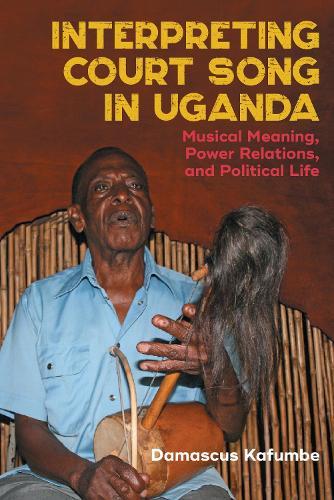Overview
A critical interpretation of essential Kiganda royal court songs that examines how the meanings of their lyrics enter into dynamic dialogue with contemporary national politics in Uganda. Lyric interpretation, which Damascus Kafumbe defines as a process of creative renewal that infuses vitality into songs, enables interpreters and analysts to derive a multiplicity of meanings from songs instead of being limited to a single literal narrative. As he and his research collaborators demonstrate, the process extends the life of a song by allowing it to generate new versions, meanings, and relevance. Kafumbe examines how lyric interpretation serves to renew the lives of twenty-one songs from the repertoires of royal court musicians of the Kingdom of Buganda, arguing that the meanings of these songs are not singular, static, and monolithic but rather dynamic and multivalent. Through extensive research within past and present contexts, Kafumbe presents a series of unique perspectives on the ways Kiganda court songs reflect varied kinds of power relations. These meanings, which surface via lyric interpretation, come from daily interactions among citizens and between leaders and subjects. This interpretive process helps illuminate truths and clarify myths about the power dynamics that shape political life in present-day Uganda, highlighting the relevance of court song lyrics to contemporary national contexts. By engaging with the book's wide range of voices, readers will learn to appreciate these songs, their historical and contemporary contexts, and their composer-performers' stories and interpretations more fully. This book is available as Open Access under the Creative Commons license CC BY-NC-ND.
Full Product Details
Author: Dr Damascus Kafumbe (Series co-editor)
Publisher: Boydell & Brewer Ltd
Imprint: University of Rochester Press
Weight: 0.666kg
ISBN: 9781648250484
ISBN 10: 1648250483
Pages: 348
Publication Date: 05 August 2025
Audience:
Professional and scholarly
,
Professional & Vocational
Format: Paperback
Publisher's Status: Forthcoming
Availability: Not yet available

This item is yet to be released. You can pre-order this item and we will dispatch it to you upon its release.
Reviews
Damascus Kafumbe deftly explores how the lyrics of twenty-one songs from the Kiganda Court in Uganda live in dialogue with their surroundings. He takes us on a not-to-be-missed journey through the interpretative process where musicians become co-analysts in order to discern and imagine the complex depths of meaning. His results are impressive and innovative for our understanding of this venerated genre of court music. -- Ruth M. Stone * Professor Emerita of Ethnomusicology, Indiana University * Deeply researched and elegantly presented, Damascus Kafumbe's Interpreting Court Song in Uganda is a standout contribution to our understanding of the African verbal arts. Drawing on a corpus of twenty-one songs from the repertoire of Buganda court music, Kafumbe unpacks their lyrics, lays bare their imaginative realms and explains the forces that enabled their construction. Notable are the voices of culture-bearers, who are featured here not only as sources of information but as co-interpreters of meaning. Notable, too, is the judicious engagement with theoretical issues raised by this mode of knowledge production. By exemplifying ways in which interpretation can be historically and culturally grounded and at the same time open, multi-faceted and plural, Interpreting Court Song in Uganda outlines numerous rich possibilities for a hermeneutics of African narrative. A must-read for all interested in African song culture. -- Kofi Agawu * The Graduate Center, City University of New York *
Deeply researched and elegantly presented, Damascus Kafumbe's Interpreting Court Song in Uganda is a standout contribution to our understanding of the African verbal arts. Drawing on a corpus of twenty-one songs from the repertoire of Buganda court music, Kafumbe unpacks their lyrics, lays bare their imaginative realms and explains the forces that enabled their construction. Notable are the voices of culture-bearers, who are featured here not only as sources of information but as co-interpreters of meaning. Notable, too, is the judicious engagement with theoretical issues raised by this mode of knowledge production. By exemplifying ways in which interpretation can be historically and culturally grounded and at the same time open, multi-faceted and plural, Interpreting Court Song in Uganda outlines numerous rich possibilities for a hermeneutics of African narrative. A must-read for all interested in African song culture. -- Kofi Agawu * The Graduate Center, City University of New York * Damascus Kafumbe deftly explores how the lyrics of twenty-one songs from the Kiganda Court in Uganda live in dialogue with their surroundings. He takes us on a not-to-be-missed journey through the interpretative process where musicians and citizens become co-analysts in order to discern and imagine the complex depths of meaning. His results are impressive and innovative for our understanding of this venerated genre of court music. -- Ruth M. Stone * Professor Emerita of Ethnomusicology, Indiana University *
Author Information
DAMASCUS KAFUMBE is the Edward C. Knox Professor of International Studies and professor of music at Middlebury College in Vermont.




